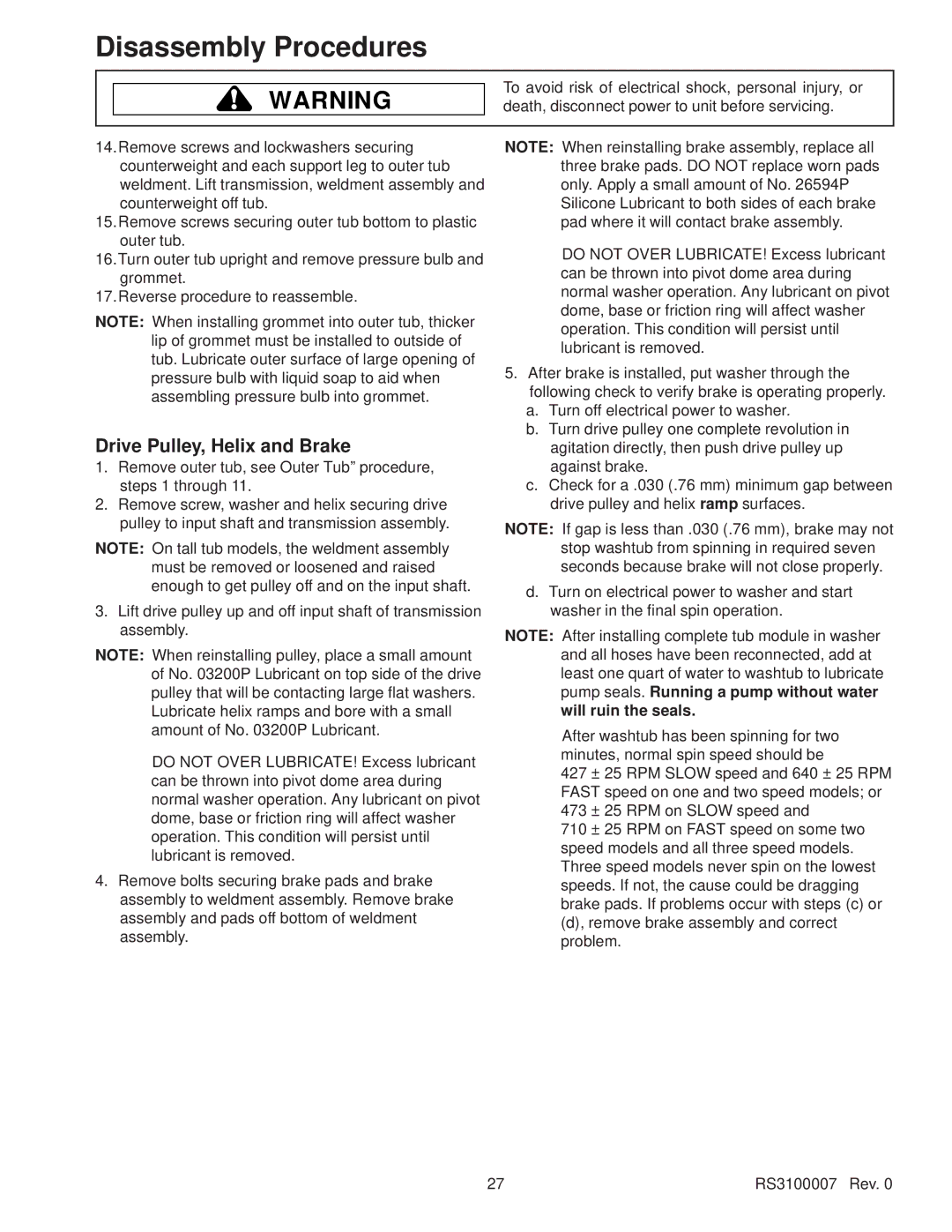Disassembly Procedures
!WARNING
To avoid risk of electrical shock, personal injury, or death, disconnect power to unit before servicing.
14.Remove screws and lockwashers securing counterweight and each support leg to outer tub weldment. Lift transmission, weldment assembly and counterweight off tub.
15.Remove screws securing outer tub bottom to plastic outer tub.
16.Turn outer tub upright and remove pressure bulb and grommet.
17.Reverse procedure to reassemble.
NOTE: When installing grommet into outer tub, thicker lip of grommet must be installed to outside of tub. Lubricate outer surface of large opening of pressure bulb with liquid soap to aid when assembling pressure bulb into grommet.
Drive Pulley, Helix and Brake
1.Remove outer tub, see Outer Tub” procedure, steps 1 through 11.
2.Remove screw, washer and helix securing drive pulley to input shaft and transmission assembly.
NOTE: On tall tub models, the weldment assembly must be removed or loosened and raised enough to get pulley off and on the input shaft.
3.Lift drive pulley up and off input shaft of transmission assembly.
NOTE: When reinstalling pulley, place a small amount of No. 03200P Lubricant on top side of the drive pulley that will be contacting large flat washers. Lubricate helix ramps and bore with a small amount of No. 03200P Lubricant.
DO NOT OVER LUBRICATE! Excess lubricant can be thrown into pivot dome area during normal washer operation. Any lubricant on pivot dome, base or friction ring will affect washer operation. This condition will persist until lubricant is removed.
4.Remove bolts securing brake pads and brake assembly to weldment assembly. Remove brake assembly and pads off bottom of weldment assembly.
NOTE: When reinstalling brake assembly, replace all three brake pads. DO NOT replace worn pads only. Apply a small amount of No. 26594P Silicone Lubricant to both sides of each brake pad where it will contact brake assembly.
DO NOT OVER LUBRICATE! Excess lubricant can be thrown into pivot dome area during normal washer operation. Any lubricant on pivot dome, base or friction ring will affect washer operation. This condition will persist until lubricant is removed.
5.After brake is installed, put washer through the following check to verify brake is operating properly.
a.Turn off electrical power to washer.
b.Turn drive pulley one complete revolution in agitation directly, then push drive pulley up against brake.
c.Check for a .030 (.76 mm) minimum gap between drive pulley and helix ramp surfaces.
NOTE: If gap is less than .030 (.76 mm), brake may not stop washtub from spinning in required seven seconds because brake will not close properly.
d.Turn on electrical power to washer and start washer in the final spin operation.
NOTE: After installing complete tub module in washer and all hoses have been reconnected, add at least one quart of water to washtub to lubricate pump seals. Running a pump without water will ruin the seals.
After washtub has been spinning for two minutes, normal spin speed should be
427 ± 25 RPM SLOW speed and 640 ± 25 RPM FAST speed on one and two speed models; or 473 ± 25 RPM on SLOW speed and
710 ± 25 RPM on FAST speed on some two speed models and all three speed models. Three speed models never spin on the lowest speeds. If not, the cause could be dragging brake pads. If problems occur with steps (c) or (d), remove brake assembly and correct problem.
27 | RS3100007 Rev. 0 |
